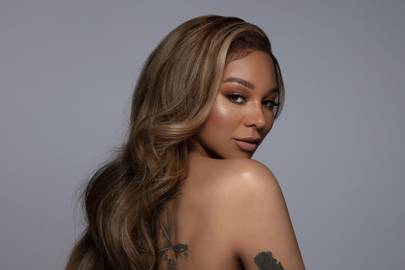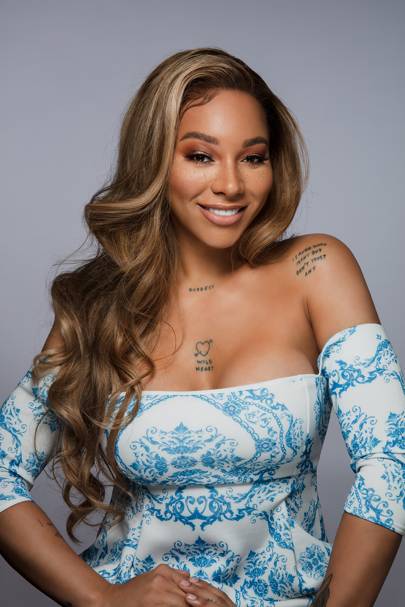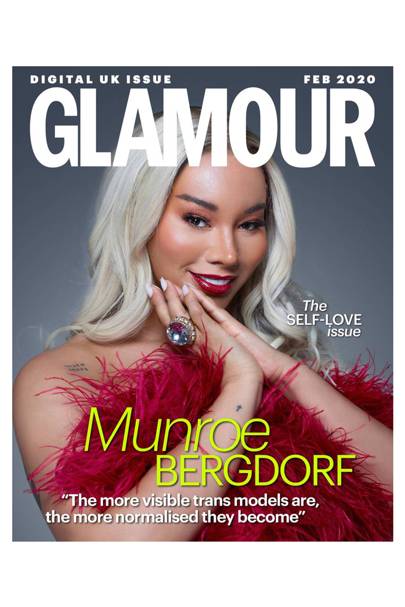Munroe Bergdorf has had to navigate her way through her fair share of hostile environments, both in real life and online. Here, in the latest edition of GLAMOUR UNFILTERED, our bi-monthly celebrity chat show hosted by Josh Smith, the model and activist speaks powerfully about dealing with negativity, damaging aspects of feminism, why we need to readdress outdated conceptions around gender and why she is trying to be the representation she never had…
WATCH: Munroe Bergdorf opens up powerfully about her experience as a black trans woman.
This has been such a time of change. How are you doing?
Personally I feel somewhat vindicated on a personal level just because what we’re speaking about in society at the moment is what I’ve been speaking about for about three years and people haven’t always got it. To be in a position now where, my work – my life’s work – is now at the forefront of the conversation with Black Lives Matter, Pride and discussions around identity I feel good in that respect. But also, it’s a very, very difficult time obviously because we’re in the midst of a virus pandemic, people are dying, and our governments aren’t doing a good job. It feels a very big paradox.
I felt like I was struggling most at the beginning of lockdown and nothing was happening, it really did feel like the world just stopped. That’s what I struggled with because my job before was very much like I was on a treadmill. I was like here, there, next place, next place – it was like that Lady Gaga meme like ‘nother club, ‘nother club! When I stopped, I really did crash. My mental health is something that I feel I need to constantly evolve when it comes to self-care, I need to make sure that I am looking after it in the unique way that I am experiencing it. I’m just really focusing on being of use to my community, keeping on top of what’s going on but not overloading myself with news.
Your post where you showed the level of hate you receive on Instagramwas heartbreaking. How have you learnt how to manage trolls and negative comments?
It’s sometimes really impossible to deal with as it just feels like a tidal wave sometimes. But, honestly, I think the biggest antidote to people hating on you is knowing who you are as a person because no one can take that away from you. If you are unsure about who you are, and then someone goes and decides to tell you about who they think you are, you’re more likely to take that on. My advice for anybody that’s experiencing hate would be, just don’t listen to it as much as you can and focus on who you want to be, who you are and honour that. I mean it really is a lot of the time just hurt people wanting to hurt other people so that they don’t need to deal with their own feelings. If you deal with how you feel and who you are then it just hurts a little bit less.

How have you learnt to become at one with yourself in that sense what have been some turning points in your kind of discovery of your sense of self?
As a trans person you’re forced to find who you are in a world that really doesn’t have any space for you. You’re forced to exist within the world that constantly wants to tear you down and invalidate your feelings, invalidate your identity, invalidate your contributions, invalidate your possibility of having what we would call a normal life or an authentic life. I kind of feel like trans people have been navigating a hostile environment our whole lives so now I feel like, it’s all coming to a head and we can see racism, facts, figures and stats because of obviously what’s happened, because of COVID-19, so the fact that black people are 50 percent more likely to die than their white counterparts, we can see the problems with police brutality not only in America but also over here. As a person of colour, as black person, as a trans person, as a queer person and as a woman, I’ve been navigating a hostile environment my whole life. I do feel like now that we’re all confronted with our phones, much more than we were we’re not distracted. I think that we’re all starting to see exactly what’s wrong with society.
How difficult has it been for you to navigate your sexual identity, your gender identity and also your racial identity all at the same time?
I didn’t connect with feminism until I discovered intersectional feminism. It is a term coined by Doctor Kim Crenshaw who is an American feminist thinker. She discovered in an American court case that it wasn’t acknowledged that black women experienced discrimination on the basis of sex and race. It was either, they are discriminated because they were a woman or discriminated because they were black, but not a black woman. She recogniwed all of the parts of our identity impact on each other so I can’t take away my queerness from my blackness from my transness.
All of our parts of ourselves impact on each. I didn’t really think feminism was for me because it wasn’t for me. It was mainly focused around the rights of white women and women who could produce babies. I’m obviously neither so it was only really when I figured out that, I could really pick my own identity and figure out a way to cope within a society that really does invalidate every single part of me, on a level.
I think it depends on what feminism you follow. Unfortunately, there’s a lot of really unhelpful feminism out there, such as the feminism that J.K.Rowling follows which is called gender critical feminism which believes that trans women are men and that the only women are women that have a uterus. That is awful because a lot of women can’t have children and does that mean that they’re less women because they’re no longer of use? It also doesn’t centre the needs of black women, of sex workers, of the people that really need feminism the most which is the most oppressed cross sections of society. So, I believe that feminism needs to lift up people that are on the front lines when it comes to sexual violence which are people that engage in sex work whether or not that’s for survival or choice, not just sex slavery of sex trafficking. But also, trans women, disabled women, people that are often overlooked within society or have the least rights need the most access to feminism.

We need to actually redefine what this archaic idea of gender is. I think there’s so many people who still prescribe to this binary idea of what gender. What does the idea of gender mean to you sitting here today?
I think that a lot of people conflate sex and gender when they’re actually two different things. Also, trans people aren’t saying that we were born biologically female – that’s not the tea – that’s not what we’re saying! If we’re attaching identity to genitalia, we’re not acknowledging that if you’re born with, say, a vagina, you may not identify with your body. We’re just assuming that that baby is going to identify with their body in later life and we don’t know that. The reality is that the body that you’re born with may not be the body that you identify later on.
We need to stop fixing identity to what you’re born with because that’s just a part of you. For me, gender identity is as unique as we are as individuals, it’s all about how you identify it isn’t about your body. It’s not about what you were born with at birth, it’s not necessarily about chromosomes, because sex isn’t binary either. Intersex people exist and we need to be honouring that as well. People are campaigning against children undergoing gender reassignment, not just surgery but healthcare because kids aren’t having surgeries that’s not a thing, but people are, in a moral panic suggesting that that is the case. Intersex kids are being operated on without their consent, without their awareness about what’s going on, so that’s like a very different conversation but that’s also linked to like the gender and sex conversation. It’s very complicated in many ways but it’s also very simple. We just need to be allowing people to be who they are.
It’s about individuality and not indoctrinating people into an archaic idea of identity. Also, we’re not taking into consideration that binary gender, as an ideology of being attached to genitalia, is very much something that’s attached to religion. As far as saying that there’s man and woman. But if you go through the world, say to South Asia, to Polynesia, to indigenous native lands, they didn’t see it that way. They saw it very much as your identity is separate to your body, your body is just a vessel. When we’re speaking about binary gender within the West we need to think about where that’s come from.
What do you think has been the biggest and most positive change in the way we talk about trans people and what are the kind of stumbling blocks you’re still coming up against?
I think the biggest thing that we need to get past is just getting stuck on the same old conversations such as trans women being a threat to cisgender women and not acknowledging the reality of the trans experience for women. The reality is that we’re not attacking anybody. There’s always going to be a rogue in every single cross section of society, but Myra Hindley doesn’t make all cisgender white women violent child murderers. So, to have one or two trans women and their crimes circulated and be the standard for all trans women is really traumatising for us as a community.
It’s really unfair because we wouldn’t say because of school shooters, all men are school shooters, it’s not fair, but it seems very much like trans women are just spare game when it comes to taking the actions of one or two and putting that on the whole community. But we see how that happens all the time. It happened with gay men in the 1980s, where gay men were constantly referred to as potential pedophiles or sexual abusers and that’s awful. So in many ways we’re navigating the environment that gay men were in the 1980s, unfortunately, but our rights are increased but even them, even our rights are on the table at the moment.

How triggering do you find it then when you see for instance, the things going on in America with laws and the rhetoric around trans people?
I’ve never thought that we’re in a progressive place. We’re in a, ‘progressive country,’ but when it comes to race and speaking about race, we’ve never been willing to speak about that. When it comes to existing as a black trans woman walking down the street and constantly being called names and constantly being treated like you’re an animal, that’s not progressive to me. I’ve never experienced the progression that, say, a cisgender white male who’s gay will experience because the gay rights movement and the rights of gay men, especially white gay men, have been very much like a vacuum for that community. A lot of the rest of the LGBTQ+ community have been left behind. There’s so much more that needs to be done when it comes to achieving progress for LGBT people.
We talk about ally ship and how we can be better to different communities but I’ve always thought, when you look at the LGBTQ+ community, there needs to be more ally ship within it. What has your experience of that been like?
It’s really frustrating because I really feel like a lot of cis, white, gay men within the community feel like well, ‘we’ve got our rights, we’re good.’ It’s very much like they’ve accessed the power and the goal was to access to power rather than access liberation for the whole community. I want to see more people that have the privileges within the community pulling each other up. I don’t experience Islamophobia, so I need to be there for my Muslim siblings, I don’t experience discrimination on the basis of my bodily ability, so I need to pull up my disabled siblings, so we’ve all got privilege in one way or another. It’s about acknowledging what privilege you’ve got and applying that to people that don’t have it. When we talk about ally ship as well it’s about using what you’re good at. I speak a lot, so I raise issues that aren’t getting the spotlight. That’s very much my privilege is being able to community but also having a big platform that I can amplify other peoples’ voices.
Exactly! It really is that simple and I wish that there was more compassion across the world. You look at Chechnya at the moment in terms of they’re having a gay purge and we need to think about ourselves as a global consciousness rather than fragmented countries because the reality is that we’re just living on islands that’s it! But we’re all within this world so if one thing happens there, then it can happen here. It just takes the wrong person to get into power and then look at what’s happening with Donald Trump in America and he’s winding back healthcare for LGBT people under the guise of religious freedom. Our rights aren’t set in stone if we don’t fight for them.
We are experiencing a wave of ally ship, but we are also experiencing a wave of cancel culture. How do you think we can get past the negative aspects of cancel culture?
Honestly, it’s going to sound harsh, but I really think that cancel culture exists within an echo chamber of ego. It can only exist if you are canceling someone on the basis that you think that you are perfect in the respect of your inability to get things wrong. We all get things wrong and I think it’s such a freeing thing to admit that you may say something stupid on Twitter, doesn’t mean that you’re an awful person it just means that you said something stupid. I think it’s more about how you respond to being called out than getting something wrong in the first place because we’re human beings. We’re flawed beings by nature. I think everything is a conversation and we’re not having conversations anymore; we’re not communicating with each other we’re just cutting each other off and hoping that one party will cease to exist.

Well I didn’t really have any trans role models that I could relate to when I was a kid. I spoke to Nadia from Big Brother the other day. We just had a little chat on Twitter. She was like the only trans woman that I saw when I was growing up that was just herself and the nation fell in love with her. Then unfortunately she was torn apart when she left the house. You could see the duality of public opinion being positive, seeing a trans person for the person that they are, and then the media being extremely transphobic and not wanting a trans person to succeed.
That’s the narrative that I exist in – I am still navigating a very toxic media environment. I relate to her more now in the capacity of what I’m navigating, but when I was younger, she was like the only trans girl that I really saw that I was enamoured by. I’m just, in many ways, trying to be the representation that I wish I had seen when I was a kid and trying not to ever put myself in a position of perfection. I’m not trying to assimilate into a culture, I’m trying to bring trans culture, bring black culture and bring queer culture in an authentic way to people that haven’t seen it before. I’m not trying to fit in, I’m trying to be myself.
It hasn’t been smooth sailing for the past three years, but now I feel like people are starting to understand and not feel threatened by somebody who’s different. I’m not trying to be black versus white or gay versus straight or anything like that it’s about everybody against oppression. It’s about everybody against racists. It’s about everybody against transphobia – not trans people versus cis people. It’s about unity and finding what brings us together.
